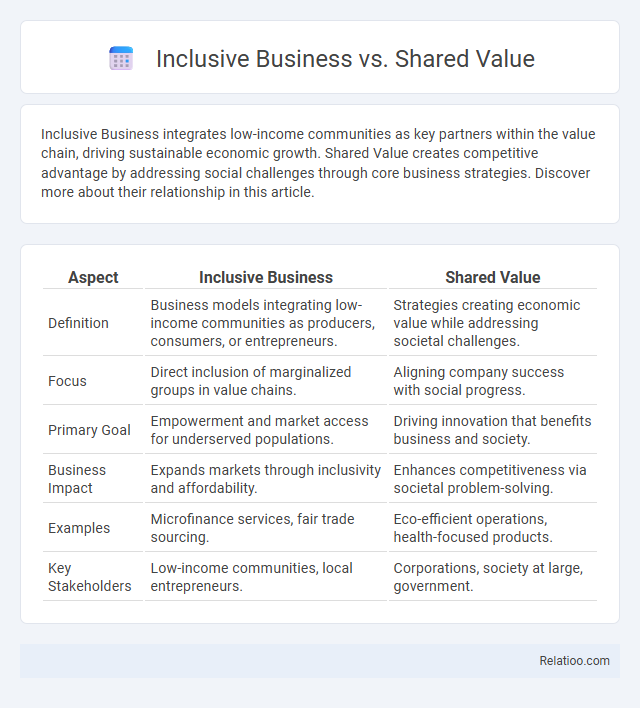Inclusive Business integrates low-income communities as key partners within the value chain, driving sustainable economic growth. Shared Value creates competitive advantage by addressing social challenges through core business strategies. Discover more about their relationship in this article.
Table of Comparison
| Aspect | Inclusive Business | Shared Value |
|---|---|---|
| Definition | Business models integrating low-income communities as producers, consumers, or entrepreneurs. | Strategies creating economic value while addressing societal challenges. |
| Focus | Direct inclusion of marginalized groups in value chains. | Aligning company success with social progress. |
| Primary Goal | Empowerment and market access for underserved populations. | Driving innovation that benefits business and society. |
| Business Impact | Expands markets through inclusivity and affordability. | Enhances competitiveness via societal problem-solving. |
| Examples | Microfinance services, fair trade sourcing. | Eco-efficient operations, health-focused products. |
| Key Stakeholders | Low-income communities, local entrepreneurs. | Corporations, society at large, government. |
Understanding Inclusive Business: Definition and Core Principles
Inclusive Business integrates low-income communities into value chains as producers, consumers, or employees, aiming for mutual economic growth and social impact. Core principles emphasize equitable opportunities, market-based solutions, and sustainable development to ensure both business viability and community empowerment. Your success in adopting Inclusive Business hinges on aligning profitability with social inclusion to drive long-term shared prosperity.
What is Shared Value? Key Concepts Explained
Shared Value is a business strategy that focuses on creating economic value in a way that also produces value for society by addressing its challenges. It differs from Inclusive Business, which integrates low-income communities into the value chain primarily as producers or consumers, and Shared Value Partnerships, which emphasize collaboration between businesses and stakeholders to drive social progress. You can leverage Shared Value to align your company's profitability with social impact, fostering sustainable growth and competitive advantage.
Comparative Analysis: Inclusive Business vs Shared Value
Inclusive Business models integrate low-income communities directly into the value chain as suppliers, distributors, or customers, aiming for economic empowerment and market expansion. Shared Value strategies prioritize creating economic value by addressing social challenges aligned with a company's core business objectives, enhancing competitiveness and community welfare simultaneously. While Inclusive Business emphasizes direct participation and market inclusion of marginalized groups, Shared Value focuses on aligning social impact with business growth through innovative solutions to systemic issues.
Historical Evolution of Inclusive Business and Shared Value
Inclusive Business originated in the early 2000s, focusing on integrating low-income communities into value chains as suppliers, distributors, and consumers to promote economic inclusion and poverty alleviation. The concept of Shared Value was introduced by Michael Porter and Mark Kramer in 2011, emphasizing the creation of economic value in a way that also generates value for society by addressing social and environmental challenges. Over time, Inclusive Business evolved from development approaches to strategic business models, while Shared Value shifted corporate responsibility towards innovation and competitiveness, aligning business success with social progress.
Main Objectives: Economic Growth vs Social Impact
Inclusive Business prioritizes integrating low-income communities into value chains to drive economic growth by creating sustainable market opportunities. Shared Value emphasizes generating social impact by aligning business success with community well-being, focusing on addressing societal challenges through profitable business strategies. While Inclusive Business targets economic inclusion and expanding market participation, Shared Value centers on shared benefits that enhance both economic returns and social progress.
Stakeholder Engagement in Inclusive Business and Shared Value
Inclusive Business prioritizes direct involvement of low-income and marginalized communities as active stakeholders, fostering mutual benefits and sustainable growth. Shared Value emphasizes creating economic value while addressing societal challenges, engaging stakeholders across the value chain to align business success with social progress. Your engagement strategy should focus on transparent communication and co-creation with stakeholders to maximize impact in both Inclusive Business and Shared Value models.
Case Studies: Real-world Examples of Inclusive Business
Inclusive Business models integrate low-income communities into value chains as suppliers, distributors, or customers, driving economic growth and social impact simultaneously. An example includes Unilever's Shakti program in India, which empowers rural women as direct-to-consumer sales agents, expanding market reach while improving livelihoods. This contrasts with Shared Value initiatives like Nestle's rural development projects, which embed social progress into core business strategies but may not directly integrate communities into operational roles.
Success Stories: Companies Implementing Shared Value
Nestle's Shared Value initiatives have improved nutrition and rural development by integrating societal needs into core business strategies, resulting in sustainable growth and community empowerment. Unilever's Sustainable Living Plan demonstrates success by reducing environmental impact while increasing market share through products like Lifebuoy soap, which promotes hygiene in developing countries. Danone fosters inclusive business models that support smallholder farmers, driving both economic inclusion and company profitability by aligning health-focused products with social impact.
Measuring Impact: Metrics for Inclusive Business and Shared Value
Measuring impact in Inclusive Business involves tracking metrics such as beneficiary income growth, access to essential services, and employment quality to ensure business practices uplift underserved communities. Shared Value impact measurement focuses on quantifying economic benefits alongside social progress, using indicators like revenue increase from new markets and social outcome improvements. You can effectively evaluate success by integrating financial performance with social impact data tailored to each model's goals.
Future Trends: The Path Forward for Inclusive Business and Shared Value
Inclusive Business models integrate low-income communities directly into the value chain, creating sustainable economic opportunities while Shared Value strategies focus on expanding corporate competitiveness by addressing social issues. Your future strategy should emphasize technology-driven solutions and cross-sector partnerships to enhance scalability and impact measurement, aligning profit with purpose. Trends show an increasing convergence where companies adopt hybrid approaches that leverage both Inclusive Business frameworks and Shared Value principles to drive systemic change.

Infographic: Inclusive Business vs Shared Value
 relatioo.com
relatioo.com